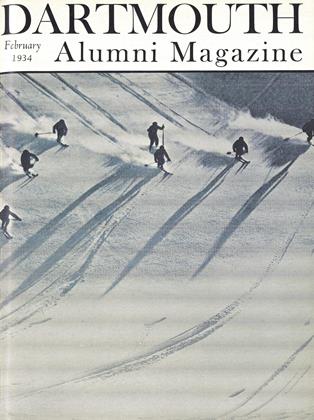President Hopkins returned to Hanover on December 22 after completing a week's survey of the Porto Rican educational system and stopping off in Washington to make a preliminary report to President Roosevelt and Secretary of War Dern. Mr. Hopkins sailed from New York on December 7, reached Porto Rico on the 11th, and began his return trip on the 18th when he flew from San Juan to Miami, a distance of 1300 miles.
President Hopkins reported that the problem of education in the public school system is extremely difficult, because of overpopulation, insufficient funds to provide for most children beyond the fourth grade, and the complications involved in giving the Porto Ricans the bi-lingual facility to live with their own kind and to carry on economic and social dealings with the people from the United States. He was favorably impressed by the work of the University of Porto Rico, and implied that charges of anti-Americanism against Jose Padin, Commissioner of Education, were unfounded.
In commenting on President Hopkins' Porto Rican survey, The New York Times of December 27 declared editorially that the appointment of Dartmouth's head was a gracious compliment to the people of Porto Rico. The editorial in full follows:
Whatever may be President Hopkins's report about educational or other conditionswithin his purview in Puerto Rico, it willcertainly prove to have been searching andits recommendations to be sound. PuertoRico is only one-third the size of the Statein which the college of "Daniel Webster stillstands (no longer "little"), but it has a population three times as great. Its insularposition, its traditions, widely differentfrom those of the mainland, and the peculiar relation in which the United Statesstands to its people, make its problemsmore difficult than those of New Hampshire. The recent Commissioner of Education, who resigned at the request of President Roosevelt, but who was later asked tocontinue till further notice, said in aThanksgiving Day address that the nativesshould be encouraged to keep and enrichtheir inherited culture, holding that it wasnot only not in conflict with "Americanism" but was compatible with full and unreserved loyalty to the ideals of the Republic.
From the policy laid down by the island'sfirst Commissioner of Education, Dr. Brumbaugh, later Governor of Pennsylvania,"the conservation of 'the Spanish and theacquisition of English,' " there has been, according to a recent communication fromour correspondent in San Juan, "little deviation." But it must require exceptionalcare to keep the two in balance. There arenot schools enough, despite all that hasbeen done in the last thirty years, to giveto all the children of Puerto Rico what theStates try to provide for their own. Thepresent school budget is $4,000,000, andfrequently 50 per cent of the total annualbudget has gone into the public schools.
President Hopkins will doubtless nothave had time to look into all the detailsof the system, but his experienced and discerning mind will have quickly comprehended the general conditions and thetrend of things. His selection to make thebrief survey is the surest evidence that thePresident wants the best advice that he canget. It is a gracious compliment to thepeople of Puerto Rico that the best manhas been sent to express our common concern for their children.
 View Full Issue
View Full Issue
More From This Issue
-
 Class Notes
Class NotesClass of 1929
February 1934 By Frederick William Andres -
 Class Notes
Class NotesClass of 1910
February 1934 By Harold P. Hinman -
 Article
ArticleHANOVER BROWSING
February 1934 By Rees H. Bowen -
 Class Notes
Class NotesClass of 1918
February 1934 By Allan C. Gottschaldt -
 Class Notes
Class NotesClass of 1908
February 1934 By Laurence W. Griswold -
 Article
ArticleA LIFE OF FREEDOM
February 1934 By Paul Starrett Sample '20







